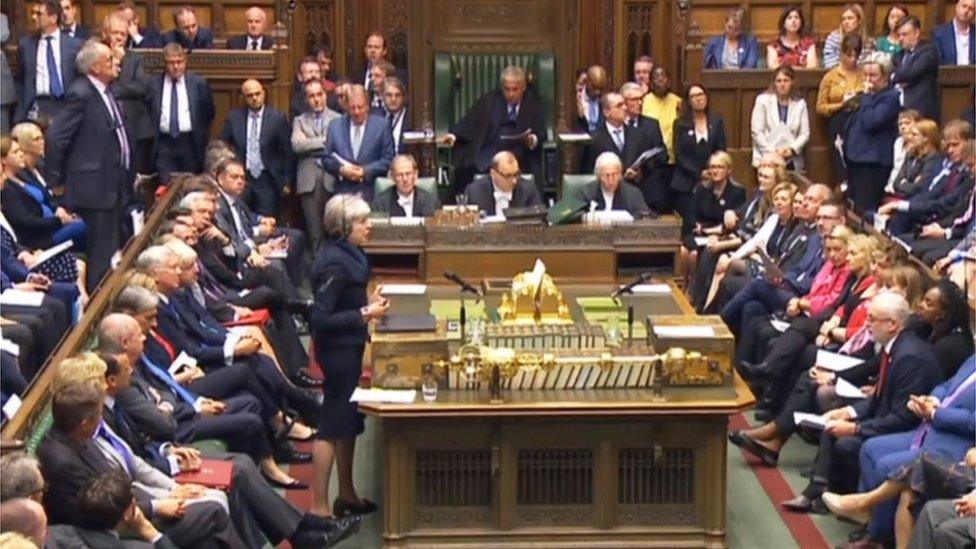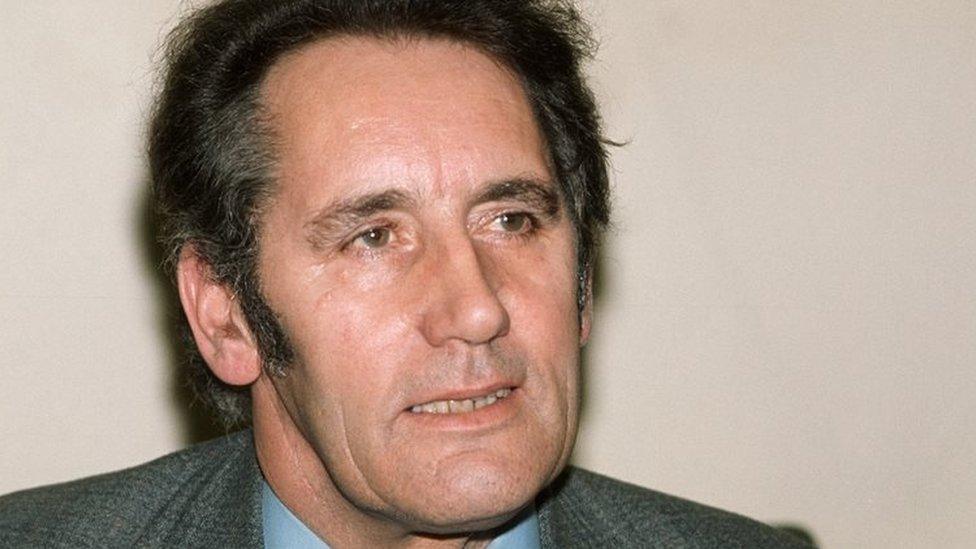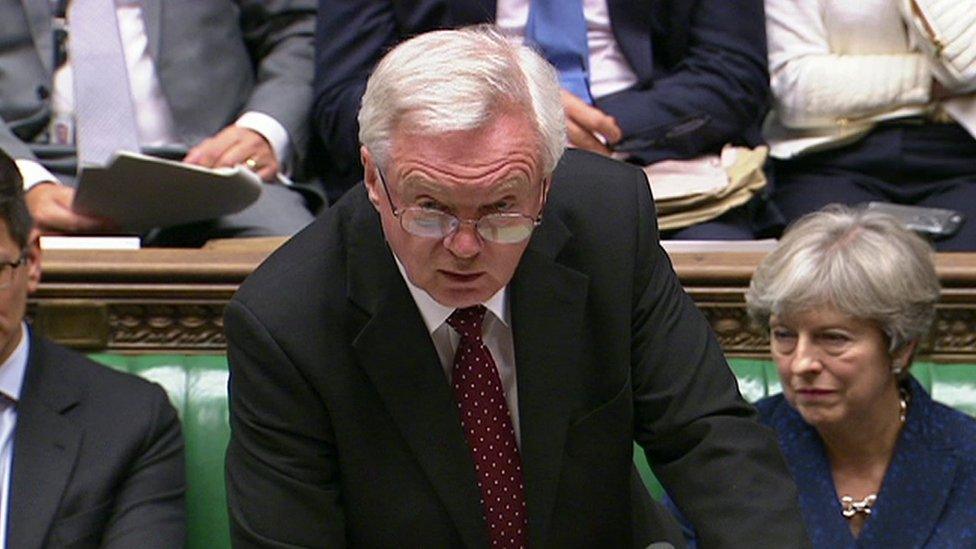'Power grab' row over committee changes
- Published
- comments

The government has to get a raft of Brexit legislation through the Commons
Jeremy Corbyn has accused ministers of an "unprecedented attempt to rig Parliament".
The Labour leader said, external Theresa May was trying to "grab power" with "no majority and no mandate" by stacking key committees with Tory MPs.
The political composition of committees which scrutinise legislation usually reflects that of the Commons.
But the government's plans would give it a majority on them - despite losing its majority in the general election.
Downing Street has defended the move, first revealed by the Huffington Post, saying: "These proposals create the fairest balance between the opposition and government, and will ensure technical, procedural rules do not cause unwarranted delays to the business of Parliament.
"The adjustments provide for maximum scrutiny with minimum disruption and delay, both to parliamentary proceedings and to the governance of the country."
But Mr Corbyn said the government appeared to be ignoring the fact the general election resulted in a hung parliament, adding: "The leader of the House, Andrea Leadsom, seems to have turned this into the idea that the government has a majority and therefore should have a majority on every committee. No. The committee system should reflect the parties' sizes in the House."
Labour MPs joined their leader in condemning the proposals. Ben Bradshaw tweeted, external: "May thinks she's a dictator. Outrageous." Valerie Vaz told the Huffington Post the government was trying to "sideline opposition in Parliament by rigging the committee system so that they are guaranteed a majority they didn't secure at the ballot box".
'Rubber stamp'
And Liberal Democrat chief whip Alistair Carmichael accused the government of trying to "ram through a destructive hard Brexit" by ignoring the election result. He said: "We will fight tooth and nail to ensure parliamentary committees reflect the will of the electorate and do not simply rubber stamp government decisions."
The proposal, put forward by Commons Leader Andrea Leadsom, external, for public bill committees would mean that where there was an odd number of MPs on the committee, "the government shall have a majority".
The DUP say they will back the government's proposal. A DUP source told the BBC: "The alternative would be spontaneous trench warfare on the most mundane of issues, and to whose benefit? Jeremy Corbyn's benefit. And we're not in the business of doing that".
The committees scrutinise legislation in detail and are an important part of the passage of bills through Parliament. The number of seats allocated to each party usually reflects the proportion of seats it has overall in the Commons.
Ordinarily this would mean the government has a majority and can get its legislation through the committees - but the Conservatives lost their majority in the June general election.
Without a majority on the committees, it would lose control of an important part of the legislative process.
With a packed programme of Brexit legislation ahead, the government has already been criticised for attempting to give ministers, rather than parliament as a whole, the power to amend a raft of EU laws.
Mr Corbyn said on Friday: "This Bill is Henry VIII writ large, Henry VIII didn't like parliament, didn't like accountability, and this government appears to be in the same vein."

Analysis
By BBC Parliamentary Correspondent Mark D'Arcy
It's one of the hidden cogs in the parliamentary machine, and in normal times it unobtrusively performs the routine chore of nominating MPs to serve on the committees which look in detail at legislation.
In parliaments where the government has a majority in the Commons the Committee of Selection is little more than a clearing house for lists brought in by the party whips, of MPs who've been chosen to serve on public bill committees, which examine legislation which has passed "second reading" in the Commons, and delegated legislation committees, which examine secondary legislation - orders made under existing law.
But in this Parliament, the government does not have a majority. It is sustained by a deal with 10 MPs from Northern Ireland - and that would normally mean it would not have a guaranteed majority on those committees - and there are so many, the DUP would not be able to put an MP on all of them to top up Tory numbers.

Walter Harrison helped a minority Labour government get legislation through in the 1970s
The problem with that is that its minority status leaves the government exposed to the danger of having its legislation re-written in committee, or vital secondary legislation thrown out.
To be sure, it is possible for the government plus the DUP to undo unwelcome changes to bills, when the legislation returns to the Commons for "report stage" consideration. But having to do that regularly could produce gridlock, at a time when ministers will need the process of lawmaking to be smooth and rapid.
There are sort-of precedents for a minority governments guaranteeing themselves majorities from the hung parliaments of the 1970s, when the legendary Labour whip Walter Harrison engineered a rule change.
The current motion to give the government a safety margin on these committees is bound to produce a furious row and accusations of ignoring the election result.
But ministers will have the support of the DUP, so they should have a majority all the same.
- Published7 September 2017
